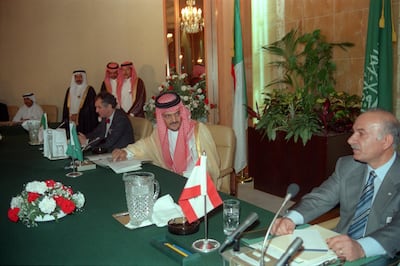When France recently supported the candidacy of Suleiman Franjieh for the Lebanese presidency, media reports in Beirut pointed out that Saudi Arabia had opposed this. One argument the kingdom’s representatives made was that if Mr Franjieh were elected to the leading post held by the Maronite Christian community against the majority of Christian parties rejecting his candidacy, this would only reinforce the Christians’ federalist urges.
The Saudis were right to bring this up. There is indeed a growing number of Christians who regard federalism as a remedy for their minority status in Lebanon. The economic crisis that has afflicted the country since 2019, and which the political class has done little about, has driven emigration among all communities. However, the fact that Christians represent a smaller portion of the population has affected them more relative to the Muslim sects.
What many proponents of federalism will hesitate to say is that they perceive it as a sort of divorce. In federal systems throughout the world, however, the adoption of federalism generally involved creating a governing structure allowing for greater unity. In the US, a federal system was adopted in 1789 to bind the states of the union more closely than the confederal structure that had preceded it and that didn’t work. Switzerland, too, adopted a federal system that replaced what had been a much looser confederation.
For many Lebanese Christians, in contrast, federalism is about greater separation – from a Muslim-majority country in which they feel less and less that they have a significant role to play in decision-making. In part, this is due to a perception that the country is now being defined by dynamics largely determined by the Sunni-Shiite relationship.

Indeed, the tendency among many Christians to expand their autonomy in the Lebanese state has existed since the civil war years, which in many respects ended the Christian-dominated Lebanon that had existed before the conflict began in 1975. In the Taif Agreement of 1989, for example, Christians had to accept that the Maronite Christian presidency would lose much of its power, but in exchange they requested broad administrative decentralisation.
Among the steps outlined in this process was the adoption of decentralisation at the level of the small administrative unit, namely the qada, each of which would be headed by a council presided by a qaim’maqam, the senior state-appointed official in the qada. In this way, predominantly Christian areas of Lebanon, namely in Mount Lebanon and parts of North Lebanon, would be able to decide on many aspects of local affairs themselves.
Those clauses in Taif relating to administrative decentralisation were never implemented, only adding to a Christian outlook that the agreement was mostly about taking from the community, while giving nothing in return. This has no doubt helped to reinforce federalist impulses in the community, on the assumption that if greater local administrative autonomy is not in the cards, then something more radical is preferable.
However, while such attitudes may point to the erosion of the Lebanese sectarian social contract, it doesn’t make federalism more realistic. While federalists envisage cantons (for lack of a better word) divided primarily among sectarian groups, the economic viability of those entities remains unclear. Nor has there been much discussion of what would happen to Christian minorities in Muslim-majority areas, or Muslims in Christian-majority areas.
While federalism does not prevent economic complementarity between cantons, when many Christians mention federalism, they tend to portray it as creating largely self-sufficient entities. This says a great deal about the debate itself. There is no reason why the Lebanese should not discuss novel political structures – federalism, broad administrative decentralisation, or others – but the real question is what they are seeking to achieve.

If the aim is to improve governance, are sectarian cantons more likely to work than a multi-sectarian makeup? There are no guarantees. While multi-sectarian orders can lead to deadlock, they also impose rules of compromise that are far more efficient for avoiding conflict than monochromatic structures. As for corruption and undermining the rule of law, all communities have been guilty of this, so sectarian cantons may not ameliorate things.
The merit of administrative decentralisation is that it is constitutionally mandated, and could serve as a valuable test for a looser political order. There seems no urgent need to go through a religiously divisive national debate over federalism when a more amenable path exists to address Christian doubts, after which the choice may be more separation, or not. It’s imperative for the political class to implement those dimensions of Taif that remain on hold.
There is a more compelling reason for why Lebanon should think twice about federalism. If it is seen as a way of effectively keeping communities apart, then it could mean losing the one thing that has most characterised Lebanon for generations: its Levantine cosmopolitanism. Few people today have an interest in this anymore, it’s true, but the fact is that without cross-sectarian co-operation, the country will surrender a great deal of what is behind its vitality.
In the end, the problem today is not the fact that Lebanese from different sectarian groups are mixing with one another. It is that each of these groups has a different vision of the state, one that is antagonistic to those of other groups. Federalism would actually only harden that divide, when the solution for Lebanon’s ills really lies somewhere else.


